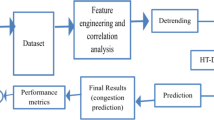Abstract
Pollutant emissions from passenger cars give rise to harmful effects on human health and the environment. Predicting traffic flow is a challenging problem, but essential to understand what factors influence car traffic and what measures should be taken to reduce carbon dioxide emissions. In this work, we developed a predictive model to forecast traffic flow in several locations in the city of Porto for 24 h later, i.e., the next day at the same time. We trained a XGBoost Regressor with multi-modal data from 2018 and 2019 obtained from traffic and weather sensors of the city of Porto and the geographic location of several points of interest. The proposed model achieved a mean absolute error, mean square error, Spearman’s rank correlation coefficient, and Pearson correlation coefficient equal to 80.59, 65395, 0.9162, and 0.7816, respectively, when tested on the test set. The developed model makes it possible to analyse which areas of the city of Porto will have more traffic the next day and take measures to optimise this increasing flow of cars. One of the ideas present in the literature is to develop intelligent traffic lights that change their timers according to the expected traffic in the area. This system could help decrease the levels of carbon dioxide emitted and therefore decrease its harmful effects on the health of the population and the environment.
Supported by World Data League and the City Hall of Porto.
Access this chapter
Tax calculation will be finalised at checkout
Purchases are for personal use only
Similar content being viewed by others
References
Barth, M., Boriboonsomsin, K.: Real-world carbon dioxide impacts of traffic congestion. Transp. Res. Rec. 2058(1), 163–171 (2008)
Chen, C.P., Zhang, C.Y.: Data-intensive applications, challenges, techniques and technologies: a survey on big data. Inf. Sci. 275, 314–347 (2014)
Díaz, N., Guerra, J., Nicola, J.: Smart traffic light control system. In: 2018 IEEE Third Ecuador Technical Chapters Meeting (ETCM), pp. 1–4. IEEE (2018)
The U.S. Environmental Protection Agency: Greenhouse gas emissions from a typical passenger vehicle (2005)
Hartanti, D., Aziza, R.N., Siswipraptini, P.C.: Optimization of smart traffic lights to prevent traffic congestion using fuzzy logic. TELKOMNIKA Telecommun. Comput. Electron. Control 17(1), 320–327 (2019)
Kanungo, A., Sharma, A., Singla, C.: Smart traffic lights switching and traffic density calculation using video processing. In: 2014 recent advances in Engineering and computational sciences (RAECS), pp. 1–6. IEEE (2014)
Lv, Y., Duan, Y., Kang, W., Li, Z., Wang, F.Y.: Traffic flow prediction with big data: a deep learning approach. IEEE Trans. Intell. Transp. Syst. 16(2), 865–873 (2014)
Observatório, A.: Estudo condutor português (2018)
Parliament, E.: CO2 emissions from cars: facts and figures (infographics). https://www.europarl.europa.eu/news/en/headlines/society/20190313STO31218/co2-emissions-from-cars-facts-and-figures-infographics (2019). Accessed 16 June 2021
Portugala, A.A.D.: Estatísticas do sector automóvel (2018)
Sanchez, K.A., et al.: Urban policy interventions to reduce traffic emissions and traffic-related air pollution: protocol for a systematic evidence map. Environ. Int. 142, 105826 (2020)
Schimbinschi, F., Nguyen, X.V., Bailey, J., Leckie, C., Vu, H., Kotagiri, R.: Traffic forecasting in complex urban networks: leveraging big data and machine learning. In: 2015 IEEE International Conference on Big Data (Big Data), pp. 1019–1024. IEEE (2015)
Shahid, N., Shah, M.A., Khan, A., Maple, C., Jeon, G.: Towards greener smart cities and road traffic forecasting using air pollution data. Sustain. Cities Soc. 72, 103062 (2021)
Sydbom, A., Blomberg, A., Parnia, S., Stenfors, N., Sandström, T., Dahlen, S.: Health effects of diesel exhaust emissions. Eur. Respir. J. 17(4), 733–746 (2001)
Instituto de Mobilidade e dos Transportes (IMT): Anuário estatístico de mobilidade e dos transportes (2019)
Vimercati, L., et al.: Traffic related air pollution and respiratory morbidity. Lung India 28(4), 238 (2011)
Zhang, J., Zheng, Y., Qi, D.: Deep spatio-temporal residual networks for citywide crowd flows prediction. In: Proceedings of the AAAI Conference on Artificial Intelligence, vol. 31 (2017)
Zhang, J., Wang, F.Y., Wang, K., Lin, W.H., Xu, X., Chen, C.: Data-driven intelligent transportation systems: a survey. IEEE Trans. Intell. Transp. Syst. 12(4), 1624–1639 (2011)
Zhang, N., Wang, F.Y., Zhu, F., Zhao, D., Tang, S.: Dynacas: computational experiments and decision support for its. IEEE Intell. Syst. 23(6), 19–23 (2008)
Acknowledgements
This work was developed in the context of World Data League, which is a global competition that aims to solve problems socially-oriented problems by using data. The data was kindly provided by the City Hall of Porto.
Author information
Authors and Affiliations
Corresponding author
Editor information
Editors and Affiliations
Rights and permissions
Copyright information
© 2021 Springer Nature Switzerland AG
About this paper
Cite this paper
Maia, P., Morgado, J., Gonçalves, T., Albuquerque, T. (2021). Applying Machine Learning for Traffic Forecasting in Porto, Portugal. In: Kamp, M., et al. Machine Learning and Principles and Practice of Knowledge Discovery in Databases. ECML PKDD 2021. Communications in Computer and Information Science, vol 1525. Springer, Cham. https://doi.org/10.1007/978-3-030-93733-1_21
Download citation
DOI: https://doi.org/10.1007/978-3-030-93733-1_21
Published:
Publisher Name: Springer, Cham
Print ISBN: 978-3-030-93732-4
Online ISBN: 978-3-030-93733-1
eBook Packages: Computer ScienceComputer Science (R0)




